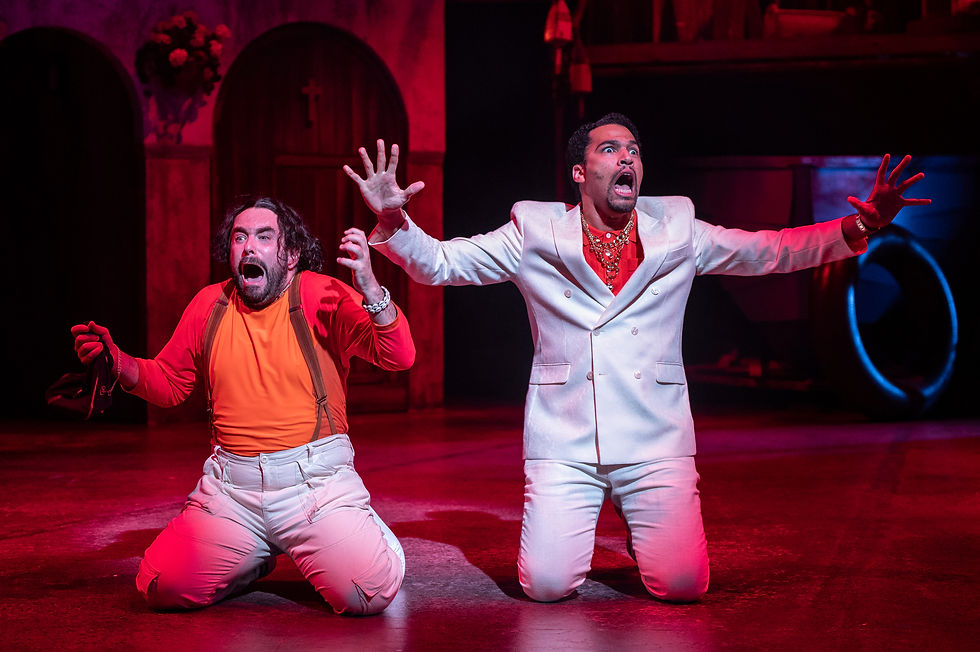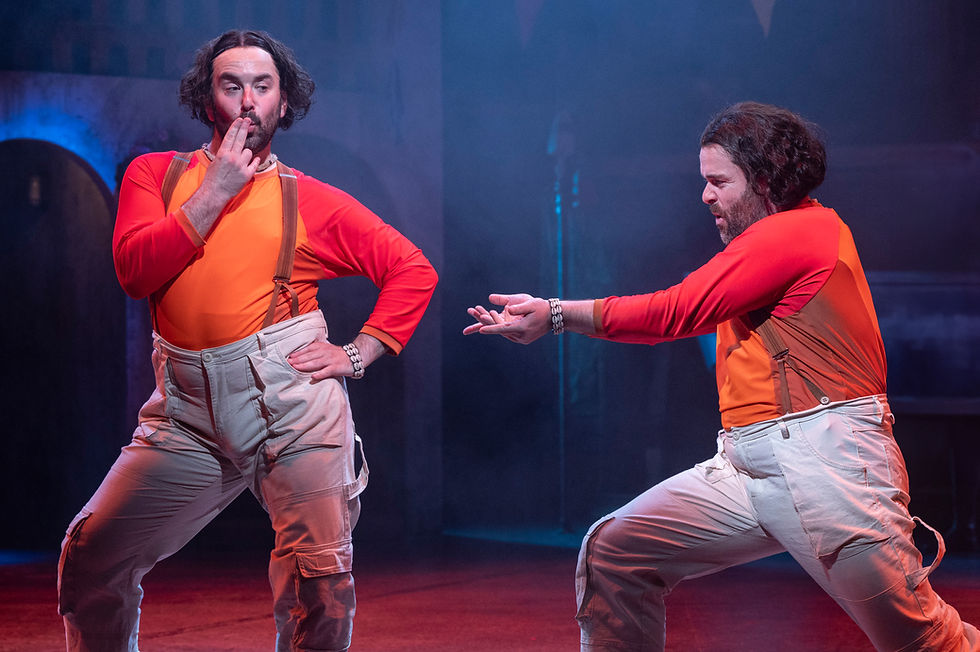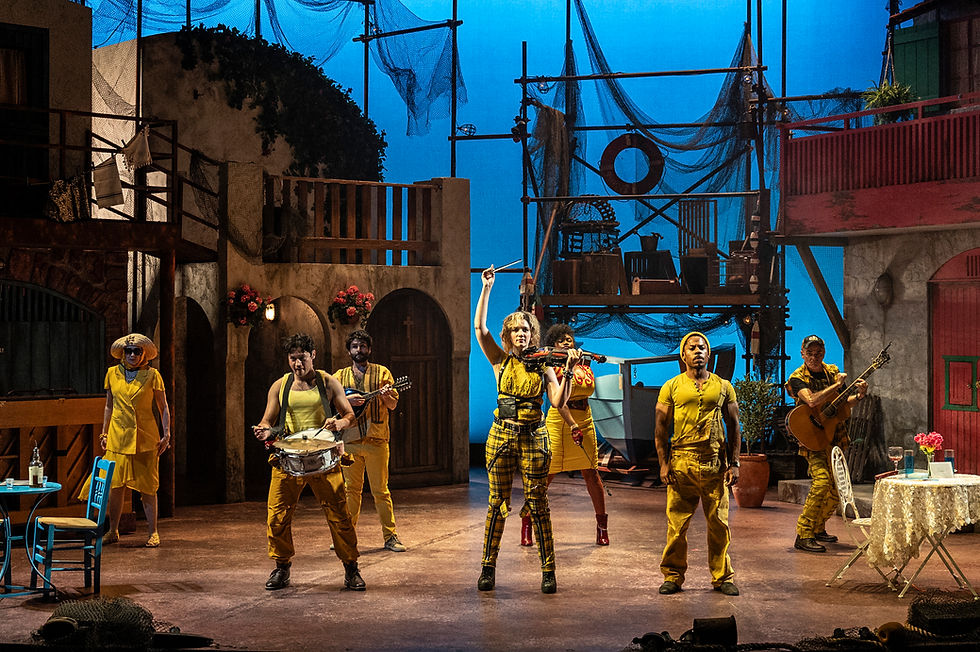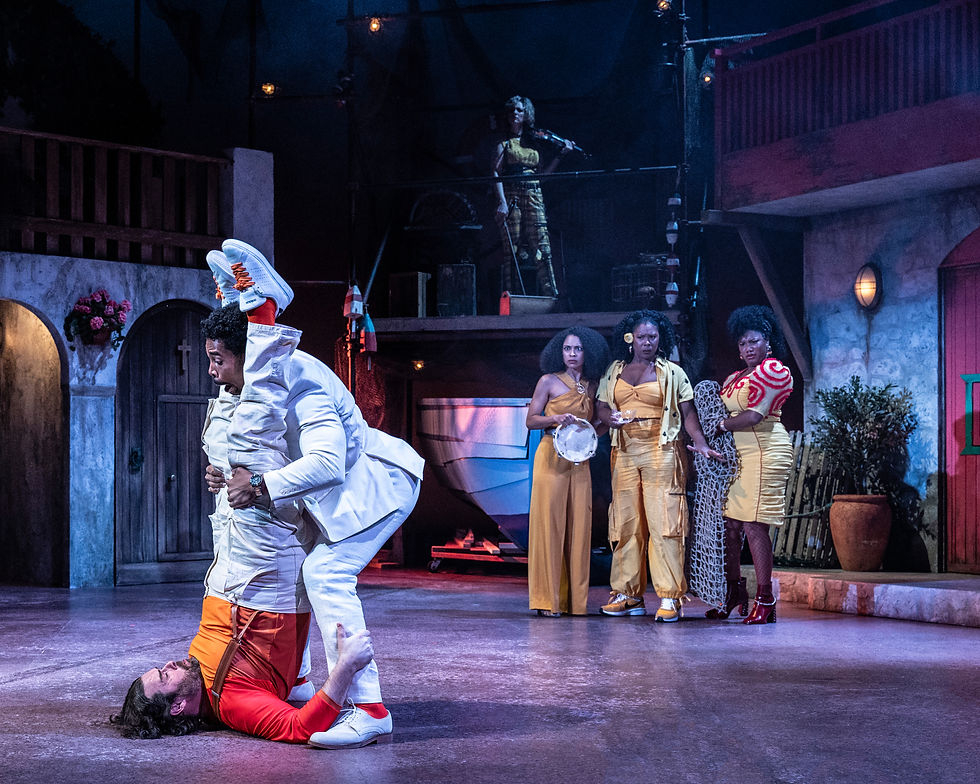Let’s cut to the chase: if you’re considering seeing Shakespeare Theatre Company’s (STC) “Comedy of Errors”—continuing at STC’s Klein Theatre through Oct. 20—just go for it.
And why not? It’s got everything! A story of lost love, begging for resolution. Long-lost twins, ripe for misidentification. An exotic yet pastoral Mediterranean setting. And a gold chain.

And that’s pretty much the plot. The twins are mistaken for one another. Wives, mistresses and aggrieved merchants demand justice (or at least exorcism). Reality comes into question and hijinks ensue. That gold chain proves insturmental.
A beautifully staged exposition narratated by old Egeon (Timothy D. Stickney, who enlivens an otherwise purely functional character) clarifies the backstory of twin separation that foregrounds the plot. But one senses early on that things will work out in the end, and that’s not a bad thing—relatively low stakes, visual cues and expressive performances make this a friendly production for the Shakespeare-curious.
But if you, like this reviewer, lump Shakespeare’s comedies into a mush of well-worn tropes, you know that truly memorable stagings of the comedies are quite rare. Read with fidelity (as this production sometimes does), the comedies are an exercise in restoring normalcy, even banality, to unruly circumstances. And where’s the fun in that?
Whatever pizazz a performance of “Comedy of Errors” achieves boils down to the antics of its two pairs of twins, and Director Simon Godwin’s energetic staging dutifully inclines in this direction.

The first pair, both named Antipholus, are the effective center of the action. As Antipholus of Syracuse, Christian Thompson toggles effortlessly between bemusement and fish-out-of-water exasperation as he is mistaken for his lookalike, the more rakish Antipholus of Ephesus, played by Ralph Adriel Johnson with relatable edginess (he’s locked out of his house! and where’s the gold chain?!). We sense both characters’ uneasiness, their newfound concerns about their perceived abnormality.
The second pair, both named Dromio (like “Romeo” but…not), anchor the screwball comedy that sets the tenor of the play. Alex Brightman and David Fynn superbly inhabit Dromio of Syracuse and Dromio of Ephesus, respectively, filling the stage with dynamism and slapstick. Together, they achieve something often elusive in Shakespeare: genuine laugh-out-loud comedy.
A wonderfully choreographed musical number just after intermission (choreography by Nancy Renee Braun) typifies how the production uses these actors’ versatile talents, along with movement and the ensemble cast to inject energy and humor into play.
Yes, this staging has musical numbers. Consistent with the production’s 1990s setting (although it seemed a more 1960s to this reviewer), the songs (composed by Michael Bruce) are folky, with lots of guitar and tambourine.

Also, pay attention to the ensemble, not just the leads. The setting and ensemble cast are central to STC’s interpretation of thie play. In Shakespeare’s "The Comedy of Errors," Antipholus of Syracuse muses while digesting the foreignness of the port town of Ephesus:
“They say this town is full of cozenage,As nimble jugglers that deceive the eye,
Dark-working sorcerers that change the mind, Soul-killing witches that deform the body, Disguisèd cheaters, prating mountebanks…” (Act I, Scene 2, 100-105)
Godwin, STC’s artistic director, seems to have leaned into this otherwise forgettable bit of expository. His Ephesus is surprisingly alive with colorful, unnamed townfolk, each decked out in sunflower yellow (costumes by Alejo Vietti), leading distinct lives on the peripheries of the bizarre twins melodrama—from an eavesdropping café patron (Ro Boddie) to a sailor who casually greets Antipholus on the street (Jacob Brandt, who gets the most memorable line of the night: “Antipholus—wazzup!”).
And the set (designed by Ceci Calf) is a jungle gym of building facades that make clear how everything takes place in public view, amidst the everyday lives of regular, weird Ephesians. They’re just like us, but they’re definitely not “normal.” The quirky townspeople’s stories—perusing menus at the café, prodding their lovers for gold (Kimberley Dodson, devilishly entertaining) and occasionally bursting into song—prove unexpectedly memorable in a way that the main plot’s mild case of identity-theft just doesn’t.
One senses that the production is aware of this disconnect. The musical interludes culminate in an impressive whole-cast finale dance number to a tune about love and oceans. It’s entertaining, for sure, but feels like we’re railroaded into an over-the-top explosion of joy timed to make us forget about the misplaced drama of the main storyline.

Among those events we might forget, intentionally or not: Egeon has almost been decapitated, just moments before the ensemble breaks into song. Meanwhile, recriminations between the goldsmith (Pearl Rhein, most adept while bribing the law) and a creditor (Boddie, who gamely limps around after an altercation with one of the Dromios) are played as straight drama, taking on the no-nonsense dry tone of ordinary business.
These self-serious moments feel antithetical to both the whimsical Ephesians and the unserious nature of the plot, like muted normalcy amidst brighter chaos, with the musical insertions like some sort of recompense, an apologetic admission that says, “Look, this is a comedy, it’s fine to forget about the more dour bits.”
This reviewer would like for the production to have gone even further, eschewing the vestiges of drama in favor of a more freewheeling reading of the text. That said, STC’s production has a propulsive, infectious energy that makes its two-hour run time fly by. It’s well worth seeing.
It will also be worth seeing, someday, an even more adventurous staging of Shakespeare’s story of twins and a gold chain, one that treats the text as pure parody of the notion of “eccentrics,” fully willing to ask, “Who among us is truly normal?”
“Comedy of Errors” has been extended through Oct. 20 at Shakespeare Theatre Company’s Klein Theatre, 450 7th St. NW, Washington, D.C., with performances Wednesdays through Fridays at 7:30 p.m., Saturdays at 2:00 p.m. and 7:30 p.m., and Sundays at 2:00 p.m. For tickets and information, call the box office at (202) 547-1122 or visit ShakespeareTheatre.org. Run time is 2 hours and 10 minutes, including intermission.
Comments